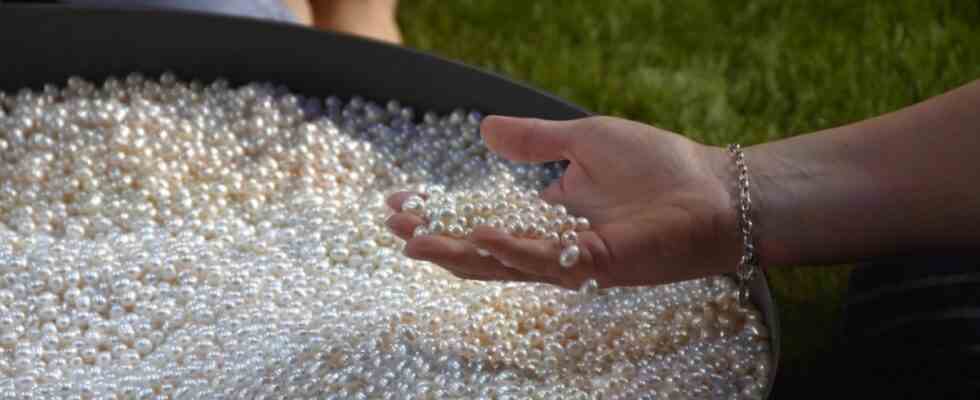Even from afar, the writing “My Precious Pearl From Paradise” shows the way. But the way to this paradise is not direct. It leads around corners and edges, sometimes lengthways, sometimes across, approaches the center and leads away again. But even if you think you are moving away from your goal, you are approaching it. Because the way to the Paradise Garden, which the Munich artist Birthe Blauth created in the Elisabeth Church in Kassel, leads through a labyrinth. And unlike in a maze, the path through the labyrinth is not designed to get lost. The path is predetermined and leads to concentration and inner contemplation. Once you have walked the green-marked paths of the labyrinth on the forecourt of the church, you get inside, into the “hortus conclusus”, the “soul bowl” and the pearls. And so to the “Poem on Pearls” by Birthe Blauth.
The writing “My Precious Pearl From Paradise” lights up at night at the Elisabeth Church in Kassel.
(Photo: Johannes Seyerlein)
For the fifth time, the diocese of Fulda and the Catholic Church in Kassel have opened their own space for contemporary art during a documenta: the Elisabeth Church on Friedrichsplatz in Kassel. In the past, some of the works caused quite a stir in Kassel, for example in 2012 when the sculptor Stephan Balkenhol installed his “man in the tower” in the same. But despite all the verbal attacks, he proved to be resistant – to this day he looks down from up there like a crucified man.
The participatory installation “Poem of Pearls” by Birthe Blauth is anything but controversial – and thus a blessing in the year of the Documenta Fifteen, which was highly controversial due to anti-Semitic contributions. It is quiet, although it represents a thoroughly radical intervention in the sacred space of the church. But the visitors, who are only allowed to enter the nave without shoes, feel positively embraced by the work. They have been coming for months – some of them keep coming, as the artist explains, who spends a lot of time on site to take part in the extensive supporting program.
Blauth has covered the nave with its adjoining side courtyards, which can be seen through large glass surfaces, with lush green artificial turf throughout. Visitors walk, stand, sit and lie still on the lawn, which has an additional three tons of sand incorporated for fire safety and stability reasons. But you don’t feel this. The lawn feels like a soft pillow. With her art installation, Blauth has managed in a convincing way to settle down there and find inner peace and contemplation.
In the middle of the nave, which is covered with artificial turf, stands the bowl with the pearls.
(Photo: Johannes Seyerlein)
At the center of the installation is a fire bowl with a diameter of 120 centimeters, which is filled with 72,000 pearls. Or rather was. Because the guests are not only asked to touch the pearls, which Blauth understands as a symbol for the souls. “Visitors can go on a spiritual journey from the labyrinth on the forecourt to the paradise garden with the pearl bowl. They take a pearl home with them as a symbol and souvenir,” Blauth explains her concept, with which she prevailed over four competitors . “Poem of Pearls” should invite you to think, “to be on the way and to enjoy with all your senses,” says Blauth. Because the sense of smell is also subtly influenced. Blauth had a company that specializes in this develop an odorant that smells “of vastness, sea and sky”, which is distributed in the church via an evaporator. It is very subtle and you only notice it consciously when you get very close to the device.
The Munich artist Birthe Blauth is very often on site. There are many conversations in the middle of the installation, as well as readings and concerts.
(Photo: Kerstin Leitschuh)
The Hortus conclusus as a closed, mysterious, paradise-like garden has been a symbol of Christian iconography for centuries. People’s ideas about it have always been characterized by supernatural beauty. Also because of that Birth Blauth chose the lush green artificial turf that never becomes unsightly. But like any earthly paradise, this one has a catch: artificial turf doesn’t rot. But the artificial turf is not disposed of, but everyone can have a piece of paradise turf (100 x 100 centimeters in size) via a platform for digital art “Unpainted”. crowdfunding campaign as a souvenir and also make a contribution to the project. After October 2nd, the turf pieces will be trimmed and donors will receive a “Piece From Paradise” signed and numbered by the artist with a certificate of authenticity. There has to be so much sustainability in paradise.
Poem of Pearls. Birthe Blauth in the Elisabethkirche on Friedrichsplatz in Kassel, until October 2nd, more information about the final program at www.kunstraumkirche.de. The catalog (104 pages, 35 illustrations) was published by Edition Braus Berlin.

